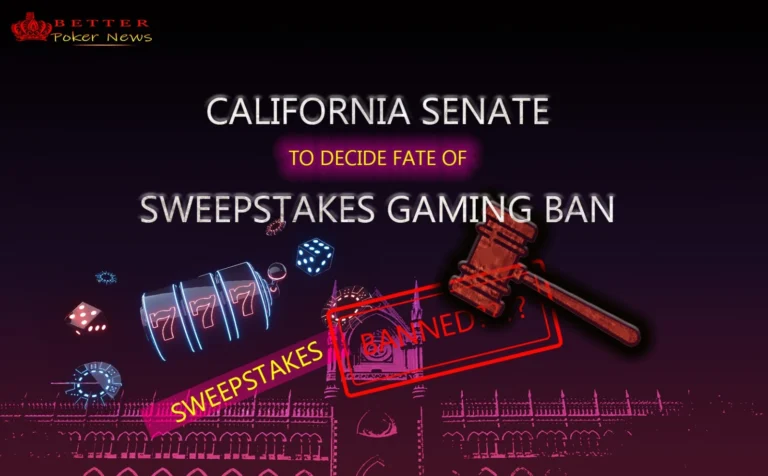California is once again at the center of a heated gambling debate. Assembly Bill 831, aimed at banning sweepstakes-style online gaming, cleared the Senate Appropriations Committee on Friday with a unanimous 7-0 vote. The decision sets the stage for a full State Senate vote in the coming weeks, marking the latest chapter in California’s long and complicated struggle over the gaming ban.
The bill, sponsored by Assemblymember Avelino Valencia (D-Anaheim), specifically targets online sweepstakes games that mimic casino-style wagering through a dual-currency model. If passed, the legislation would reshape the online gaming landscape in California—affecting players, tribal casinos, and gaming companies alike.
Also Read: Pattaya Police Raid-Underground Poker House, Nine Detained

The Core Issue: The ‘Dual-Currency’ Model
Sweepstakes gaming platforms like Global Poker and ClubWPT Gold operate in a legal grey zone by offering games that look and feel like online casinos. Players use virtual currency to play, which can later be redeemed for real money or prizes.
The loophole lies in the fact that these sites promote a “No Purchase Necessary” option, allowing players to obtain virtual chips for free by mail or online. In practice, critics say, the system mirrors gambling without being regulated like traditional casino play.
Valencia has argued that this practice undermines California’s established gambling framework, which is built around tribal sovereignty and voter-approved compacts.
“We cannot look the other way while these platforms exploit legal grey areas,” Valencia said earlier this summer. “These operations undermine the voter-approved framework that affirms Tribal governments’ sovereign right to conduct gaming in California. AB 831 strengthens that framework and ensures gaming in California remains fair and accountable.”
Tribal Support: Protecting the Framework Of Gaming Ban
Supporters of AB 831 include major tribal groups such as the Yugaaviatam of San Manuel Nation and the California Nations Indian Gaming Association. Both organizations argue that sweepstakes sites erode the carefully negotiated agreements between tribes and the state.
These compacts, first established decades ago, allow California tribes to operate casinos on tribal lands under strict regulations. They represent billions of dollars in annual revenue for tribal communities, funding education, healthcare, and economic development.
By banning sweepstakes gaming, tribes argue, the bill will preserve their exclusive gaming rights and ensure that gaming revenues remain accountable under state law.
Opposition: Smaller Tribes Push Back
Not everyone is celebrating the bill’s progress. Some smaller California tribes argue that AB 831 favors larger, established gaming interests while cutting off potential new opportunities.
These smaller tribes see sweepstakes gaming as a potential pathway to enter the online poker market, which remains illegal in California despite years of lobbying. Partnering with sweepstakes sites could have allowed them to compete on a broader scale, especially against larger tribal operators.
Critics say the bill risks creating a monopoly-like environment, where only the wealthiest tribes and gaming corporations maintain influence, leaving smaller players behind.
The Road Ahead: What Happens Next
With a 7-0 approval and no debate in committee, AB 831 now heads to the California State Senate floor. Lawmakers are expected to vote within the next few weeks. If the Senate approves the bill, it will return to the Assembly for re-approval, since the measure has been amended since it last passed there. Lawmakers must act before the legislative session closes in mid-October. Should AB 831 clear both chambers, it will head to Governor Gavin Newsom’s desk for signature. A veto is considered unlikely, given the strong tribal support and bipartisan interest in closing the legal loophole.
Also Read: Poker Memes at the Felt: How Humor Shapes Modern Culture
Conclusion: A Defining Moment for Online Gaming Ban in California
California’s long-running gambling debate is entering another pivotal phase. For supporters, AB 831 is about protecting tribal sovereignty, ensuring fairness, and closing dangerous loopholes in online gaming. For opponents, it’s a missed opportunity—blocking smaller tribes and potential innovations in online poker.
Regardless of the outcome, the bill highlights a broader truth: California remains the most coveted but contested battleground in the American gambling landscape. Whether this bill marks the end of sweepstakes gaming or the beginning of a new legal fight, one thing is certain—the future of online gambling in California is about to be redefined.


2 Comments
Pingback: Thomas Eychenne Wins EPT Barcelona
Pingback: Grant Hinkle Wins 2025 Oklahoma State Championship Main Event